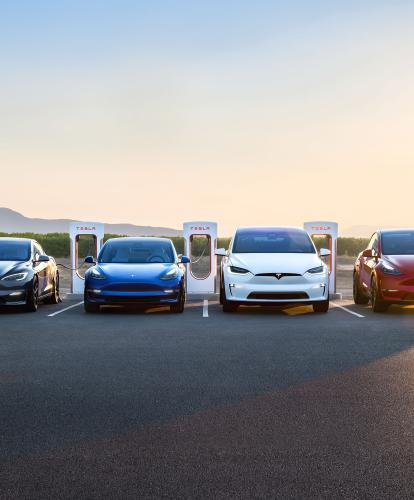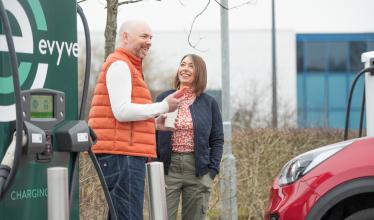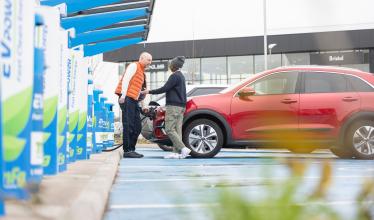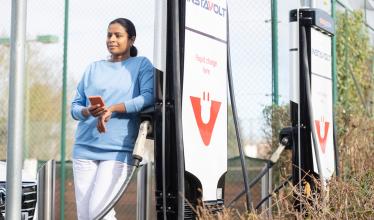Tesla network cost
Tesla Supercharger
Membership cost: None
Cost per charge typically: 43p/kWh
Non-Teslas on Public Superchargers: 53p/kWh
Price may vary depending on charge rate, location and time of use.
Tesla Destination
Membership cost: None
Cost per charge: Free
Parking charges may apply
To discover how much it will cost to charge an EV from a Tesla Supercharger charge point, head to Zapmap’s Public Charging Calculator. This allows you to select any new or used Tesla, and tailor elements – such as electricity cost and charge required – for personalised results.
How to use the Tesla network
No separate RFID card or smartphone app is required to access Tesla Supercharger or Destination points when charging a Tesla EV. Costs are charged to an account linked to the car.
Some Tesla Supercharger sites offer charging to non-Tesla vehicles.
To use Tesla charging with another model of EV:
- Download the Tesla app and create a Tesla Account.
- Select 'Charge Your Non-Tesla' and find your Supercharger site.
- Add your payment method, plug-in your car, select a stall and tap 'Start Charging'.
- Select 'Stop Charging' to complete your session.
Accessing Tesla Destination charge points
Because access is dependent on car-to-charger communication, for non-Tesla drivers there is no Supercharger or Destination cross-network compatibility. To use other network points, they must first follow the same processes as any other customer.
However, Tesla often installs a non-Tesla specific Type 2 charge point alongside its Destination chargers. These are available for any EV driver to use, providing they have a Type 2 inlet on their car, since the units come with tethered cables.
The open-access charge points do not have a cost to use, as with the Tesla Destination units, and look identical. Often installed alongside the Tesla-specific points, signage is added to differentiate between the units for ease of use.
On Zapmap, these charge points are listed as being under the Tesla Destination network. However, where Tesla-specific points are listed as ‘Tesla’ (below left), open points are listed as ‘Type 2’ (below right).
Where are Tesla charge points located?
All Tesla points – Supercharger, Tesla Public Supercharger, and Destination – can be found on Zapmap using the network filter. You can use this on both the Zapmap app and our desktop map.
For open-access Tesla Destination points (see below in “Accessing points on other networks”), Zapmap users can also filter by connector type. To find Tesla Supercharger or Destination charge points, select the “Tesla 7kW/11kW/2kW” Type 2 option under connector types filters.
Non-Tesla drivers wishing to find open-access Tesla Destination points can search by Tesla Destination on the network filters, while also selecting the generic “Type 2 7kW/22kW” options under Connector types.
Charging types and speeds can be filtered too, showing only those points that are compatible with users’ cars.
Accessing Tesla Destination charge points
Because access is dependent on car-to-charger communication, for non-Tesla drivers there is no Supercharger or Destination cross-network compatibility. To use other network points, they must first follow the same processes as any other customer.
However, Tesla often installs a non-Tesla specific Type 2 charge point alongside its Destination chargers. These are available for any EV driver to use, providing they have a Type 2 inlet on their car, since the units come with tethered cables.
The open-access charge points do not have a cost to use, as with the Tesla Destination units, and look identical. Often installed alongside the Tesla-specific points, signage is added to differentiate between the units for ease of use.
On Zapmap, these charge points are listed as being under the Tesla Destination network. However, where Tesla-specific points are listed as ‘Tesla’ (below left), open points are listed as ‘Type 2’ (below right).
Contact details
Tesla Support & Roadside Assistance: 0162 845 0660
For further support and contact information visit the Tesla website.
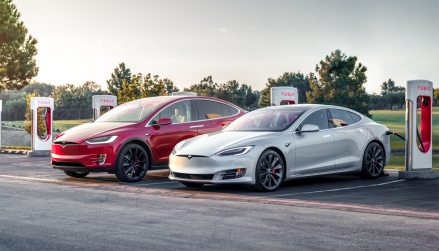
How does Tesla compare to other networks in terms of pricing?
Zapmap monitors the prices of charging on the public network and reports on the prices charged by the top 10* rapid charging networks. The prices are updated on a monthly basis here: Rapid Charging: Top 10 Network Pricing
The price to charge an electric vehicle (EV) on the public charging network can vary substantively, and prices are increasing due to current issues in the energy market.
Updated on a monthly basis, the Zapmap Price Index shows the difference in prices paid depending on the type of charger and will also track how this is changing over time.
About Tesla
Tesla operates two different networks – Destination and Supercharger. Destination chargers are installed at locations such as hotels where drivers are likely to spend a longer period of time, while the Supercharger network allows Tesla drivers to rapid charge on the UK’s major trunk roads.
In 2022, Tesla opened up a small number of its Superchargers to other brands. Drivers can find these chargers using the network filter under ‘Tesla Public Supercharger’.
For drivers of older Tesla models, use of both networks is free. Any Tesla ordered after 15th January 2017 will need to pay to use the rapid Supercharger points, though each vehicle has 400 kWh in Supercharging credits a year, enough for around 1,000 miles annually.
Destination chargers are free to use by all Tesla drivers who are customers of the destinations where points are located. The Fast chargers – typically 22kW – are intended to top up the Tesla's over the course of several hours, as opposed to the high power 120kW or 150 kW Superchargers.
The Tesla Supercharger network is one of the UK’s fastest, with Supercharger speeds of either 120 kW or 150 kW available. This is more than twice as fast as the majority of the CHAdeMO or CCS rapid units.
The manufacturer considered providing a network of charging points essential in the promotion of electric vehicles as viable alternatives, and Tesla drivers can use Supercharger points in any country without the need to sign up for different national standards etc.
Destination chargers allow for the same international usage, and often Fast charge at 22kW. The purpose of the Destination points is to expand Tesla’s reach beyond the main motorway network where its Superchargers are located.
